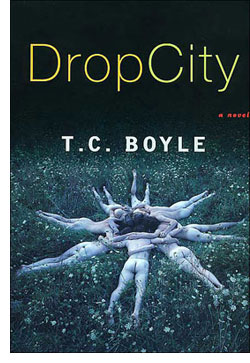(Don’t) Drop in
 In the 1980’s our extended group of college friends would go visit “The Cabin” for long weekends at a time. The Cabin, always discussed in hushed reverence or high ebullience or a strange combination of both, was a hunting lodge partially owned by my father and deep in the wilds of the Pine Barrens, far from a paved road or the strictures of civilization. It was a place removed from telephones, television, and all routine responsibility that wasn’t somehow connected with convening in the woods for three days (i.e., digging a new trash pit, cooking gritty chicken over an improvised grill perched too low over the sand, and drinking about one case of beer each). Even writing this post about it gives me a frisson of excitement.
In the 1980’s our extended group of college friends would go visit “The Cabin” for long weekends at a time. The Cabin, always discussed in hushed reverence or high ebullience or a strange combination of both, was a hunting lodge partially owned by my father and deep in the wilds of the Pine Barrens, far from a paved road or the strictures of civilization. It was a place removed from telephones, television, and all routine responsibility that wasn’t somehow connected with convening in the woods for three days (i.e., digging a new trash pit, cooking gritty chicken over an improvised grill perched too low over the sand, and drinking about one case of beer each). Even writing this post about it gives me a frisson of excitement.
Currently I’m reading “Drop City” by T.C. Boyle about a group of hippies in 1970 who drop out in California and form a commune, and then drop further out, into Alaska.
A moment while I reflect on how much I’ve always despised the hippie mystique. Granted, it wasn’t my generation, but the veneration of drug-addled layabouts is decidedly contra to my own convictions. The world has things that need to be done. Sure, we would go have a Cabin Weekend for three days as a release mechanism, but we returned. Already some of us were business owners; on the final Cabin Weekend, some of us were parents with babies in tow.
What has been truly eye-opening about “>Drop City — in addition to Boyle’s mellifluous prose and riveting storyline and characters — is how little thought any of us ever gave to disaster. Looking back 20 years later, I now think that we were courting potential disaster every weekend. My friends and I were upright citizens of the woods, so we never had anything to fear from each other except mishap. But we had an open-door policy: Anyone who showed up was invited in. Deep in the woods, that sort of thinking doesn’t always serve you well.
Down the path and past the runoff across the cranberry bog was a large open flat space deep with white sand. Occasionally groups would show up there while we happened to be on the other side of the water at the Cabin. One time the group that arrived were the Hell’s Angels. Were they the true California Hell’s Angels? If not, they were certainly close kin. We could hear them and they could hear us. At the Cabin, everyone grew worried. We were outnumbered, and it would be nothing for this group to overtake us if they wanted. I’ll never forget the look in my the eyes of my then-girlfriend (now wife) when I picked up a sixpack of Old Milwaukee and headed for the door with my best friend Ski in tow. “Where are you going?” she said. “To say hello and welcome them to the neighborhood,” I said and walked out. Because really, what choice did we have?
At the Cabin, it transpired that one could greet a motorcycle gang with a six-pack, sit by the fire briefly and chat, make nice, and leave untroubled. Things don’t work out this way in “Drop City.” The power of fiction is in making you reflect on your life in a new way. And that’s exactly what I’ve been doing while reading this book: looking back on Cabin Weekends as a time when we were consistently very very lucky.

December 14th, 2006 at 12:43 pm
Several of Lee’s plays have been set in the woods. When I have seen them I instantly knew the spot in the woods he was think of when writing the play.
When we were at the Cabin site last January we were standing next to the old cranberry bog looking at the pine trees across the still water with the reflection of the white and gray clouds thinking of the fun we had. I have the digital picture of this scene as the desk top of my iBook and catch myself at times just looking at the picture when I thought I was doing work on my computer.
Paul
December 17th, 2006 at 5:44 pm
I’ve only been to the cabin once. Wish it was still there.
T. Coraghessan Boyle is also a fine short story writer. I have two collections of his on my shelves. Well, one is on my daughter Tara’s shelves, as she is an omnivorous and voracious reader, and actually pays attention to my recommendations. The collections are IF THE RIVER WAS WHISKEY and WITHOUT A HERO. The former begins with a tale entitled “Sorry Fugu” which sets a slightly twisted tone for all that follows.
Also, his novel THE ROAD TO WELLVILLE was made into an interesting movie with the abbreviated title “Wellville”.
If you’re curious about the hippy era, check out William Kotzwinkle’s novel, THE FAN MAN. This too was on my daughter’s shelves, but may in fact be her copy. It opens with this sentence.
“I am alone in my pad, man, my piled-up-to-the-ceiling-with-junk pad.”
You should read it.